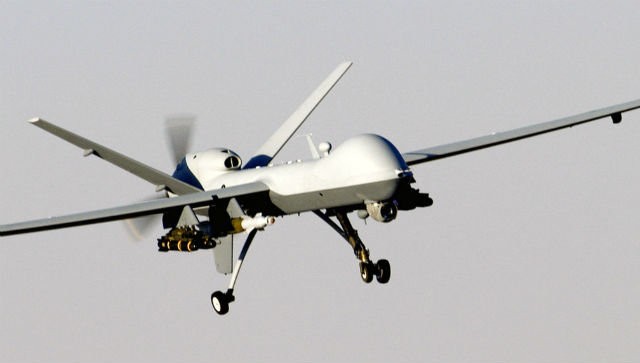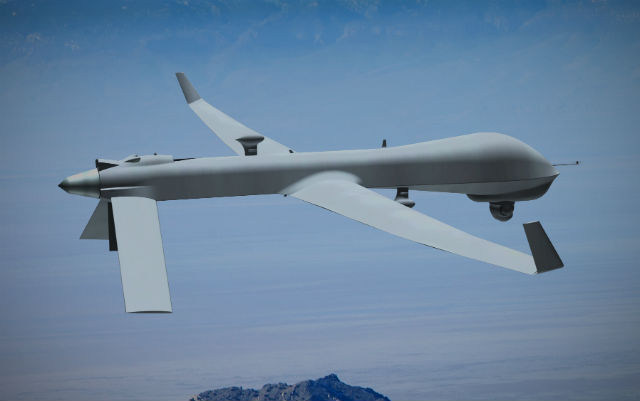Following requested purchases of General Atomics Aeronautical Systems Predator/Reaper-series unmanned air vehicles by France and the Netherlands in recent weeks, the USA’s backing of an export licence for India but a rejection for Jordan have raised questions over how much potential the UAVs really have outside of NATO.
Later this year, General Atomics is expected to take an MQ-9 Reaper out of storage to deliver to the French air force, Flightglobal understands. On 5 February, the US Air Force announced a plan to award the company $3.8 million to return the aircraft to flying status and modify it to the unarmed French configuration. Paris ordered an initial two MQ-9s in June 2013, followed by a deal for 16 more announced two months later.
The US Defense Security Cooperation Agency (DSCA) said on 6 February that the Netherlands has requested a Foreign Military Sales deal for four MQ-9 Block 5 systems and associated equipment, worth $339 million. Still requiring Congressional approval, a sale to the NATO nation has been in the pipeline for some time. “It is vital to assist the Netherlands to develop and maintain a strong and ready self-defence capability,” the DSCA says.
An MQ-9 NATO users group was established during the alliance summit in Newport, Wales, last September. Officials from France, Italy, the UK and the USA are believed to have met in January to discuss the group’s terms, in a bid to enhance interoperability.
Where such NATO custom will take General Atomics, however, is largely speculative. As it attempts to break beyond this market and into other promising areas, the US government and restrictions on UAV sales present a barrier to the company.

United States Air Force
It has invested in an export-specific Predator XP variant – effectively an unarmed, surveillance-only version of the MQ-1 that has become synonymous with unmanned air strikes in the USA’s areas of operation – but only the United Arab Emirates to date has been permitted to purchase the aircraft.
When US President Barack Obama visited India in January, a request for a Predator XP purchase was expected, with New Delhi seeking an array of unmanned technologies.
General Atomics confirms that the US government has granted it a DSP-5 export licence, enabling it “to engage in discussions with the government of India, as well as local industry, for the potential sale of Predator XP”.
Jordan, meanwhile, is seemingly focusing all of its military power on the fight against Islamic State militants, following the killing of a captured air force pilot. General Atomics is understood to have requested export licence applications earlier in 2014 for a possible sale to Amman, but the US state department rejected this. “We defer to the two governments for comment on this issue,” says the company, which is “ready to support whichever decision is made”.
The restrictions of the international Missile Technology Control Regime are likely to play a part in the US government’s decision to veto certain aircraft sales. Washington would not be allowed to sell military technology to a nation if it could end up in the hands of an insurgent group, for example.
Sales to Jordan and India would also rock the boat between the USA and Israel. Jordanian sales would upset Israel politically, while India is a significant market for Israel’s UAV industry that it would be hesitant to lose.

General Atomics Aeronautical Systems
As the export market sharpens focus, the outlook on the US military side appears bleak. General Atomics has delivered all 164 MQ-1s that the USAF requires, while the US Army plans to order a final batch of 17 MQ-1C Gray Eagles in the next fiscal year, completing a need for 158 aircraft. Even demand for the MQ-9 Reaper is nearly exhausted. On 4 February, the USAF announced the award of a $279 million contract to the type’s manufacturer to deliver 24 MQ-9 Block 5 aircraft and related equipment. That leaves only 77 aircraft remaining in the USAF’s plan to acquire 361 Reapers, with a final order expected in fiscal year 2019.
There may be additional demand in the US intelligence community’s classified budgets, however. Last April, a senior company official told Flightglobal that it is delivering one Avenger – a jet-powered, armed UAV with radar stealth characteristics – every nine months to a classified customer, and that there could be additional Reapers in the pipeline as well.
The unclassified budget, though, has formed the backbone of General Atomics’ order backlog since the late-1990s, and it is diminishing with no known requirement in the acquisition pipeline to replace the inventory. At the same time, the US Navy is deferring by three years to 2023 a plan to field an unmanned, carrier-launched surveillance and strike aircraft, for which the Avenger is competing against rival bids from Boeing, Lockheed Martin and Northrop Grumman.
Additional reporting by Stephen Trimble in Washington, DC
Source: FlightGlobal.com


























